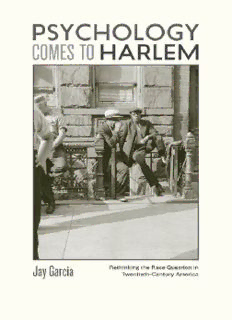
Psychology Comes to Harlem: Rethinking the Race Question in Twentieth-Century America PDF
Preview Psychology Comes to Harlem: Rethinking the Race Question in Twentieth-Century America
Psychology Comes to Harlem New Studies in American Intellectual and Cultural History Howard Brick, Series Editor Psychology Comes to Harlem Rethinking the Race Question in Twentieth-Century America JAY GAR CIA The Johns Hopkins University Press Baltimore ∫ 2012 The Johns Hopkins University Press All rights reserved. Published 2012 Printed in the United States of America on acid-free paper 2 4 6 8 9 7 5 3 1 The Johns Hopkins University Press 2715 North Charles Street Baltimore, Maryland 21218-4363 www.press.jhu.edu Library of Congress Cataloging-in-Publication Data Garcia, Jay, 1972– Psychology comes to Harlem : rethinking the race question in twentieth-century America / Jay Garcia. p. cm. — (New studies in American intellectual and cultural history) Includes bibliographical references and index. isbn-13: 978-1-4214-0519-3 (hbk. : acid-free paper) isbn-10: 1-4214-0519-9 (hbk. : acid-free paper) isbn-13: 978-1-4214-0541-4 (electronic) isbn-10: 1-4214-0541-5 (electronic) 1. American literature—African American authors—History and criticism. 2. African Americans—Intellectual life—20th century. 3. Wright, Richard, 1908–1960— Criticism and interpretation. 4. Baldwin, James, 1924–1987—Criticism and interpretation. 5. Harlem (New York, N.Y.)—Intellectual life—20th century. I. Title. ps153.n5g24 2012 810.9%896073—dc23 2011034757 A catalog record for this book is available from the British Library. Special discounts are available for bulk purchases of this book. For more information, please contact Special Sales at 410-516-6936 or [email protected]. The Johns Hopkins University Press uses environmentally friendly book materials, including recycled text paper that is composed of at least 30 percent post-consumer waste, whenever possible. Where men have always looked around And searched for secrets never found, You saw a vision, dark, profound; You heard beneath a distant sound; You took the lid o√ the Underground. Fredric Wertham to Richard Wright I could never understand why people think these structural questions were not connected to the psychic, with emotions and identifications and feelings because, for me, those structures are things you live . . . they have real structural properties, they break you, they destroy you. Stuart Hall This page intentionally left blank contents Acknowledgments ix Introduction 1 1 Richard Wright Writing: The Unconscious Machinery of Race Relations 19 2 Richard Wright Reading: The Promise of Social Psychiatry 49 3 Race and Minorities from Below: The Wartime Cultural Criticism of Chester Himes, Horace Cayton, Ralph Ellison, and C. L. R. James 75 4 Strange Fruit: Lillian Smith and the Making of Whiteness 102 5 Notes of a Native Son: James Baldwin in Postwar America 136 Conclusion 170 Notes 177 Essay on Sources 201 Index 209 This page intentionally left blank acknowledgments Many people helped to make Psychology Comes to Harlem possible. For their formida- ble critical talents and generosity I thank my main dissertation advisors in the Program in American Studies at Yale University. Jean-Christophe Agnew’s ‘‘Ameri- can Century’’ course was the challenging and indispensable starting point for the book, and his close attention to the particulars of the project always buoyed my spirits. My work was likewise sustained by Hazel Carby’s enthusiasm about the project and the model of her own scholarship. Michael Denning’s combination of sound practical advice and exacting questions was essential for seeing the project in new ways at crucial junctures. Several other colleagues a≈liated with the American Studies Program and Department of African American Studies at Yale University shaped my thinking in di√erent ways throughout the trajectory of the project. Paul Gilroy, Alan Trachtenberg, Matthew Jacobson, and Jonathan Holloway provided vital insights and leads. While at Yale, I was lucky to be part of an excellent writing group that quickly became an invaluable resource. Amy Chazkel, Michael Cohen, Mark Overmyer- Velazquez, Tori Lawless, and Fiona Vernal helped me strengthen my arguments. Scott Saul, Becky Ruquist, Leigh Raiford, Lori Brooks, JJ Fueser, and Joseph Thomp- son were also key interlocutors and made graduate studies a great deal of fun to boot. Shafali Lal’s passion for scholarship, as for social change, was another resource as I worked on this study. Questions she posed in her own work were not only relevant to my research, they also led me to conduct more searching investigations. A presen- tation based on the first phase of my research came about only after Shafali’s insistence that we jointly organize an American Studies Association panel. Her humor, vision, and skill in seeing the best in others continue to wend through the lives of those she touched. While teaching at the University of North Carolina at Chapel Hill, my work on the book benefited from critiques by John Kasson and Fred Hobson and the support
Description: